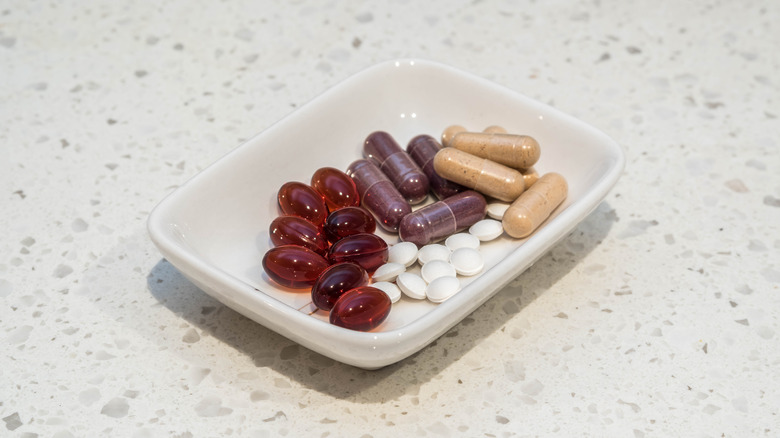Mistakes You Didn't Know You Were Making With Vitamins
From probiotics to vitamin C supplements to multivitamins and everything in between, the options are endless. According to a 2019 poll conducted on behalf of the American Osteopathic Association, people are taking more vitamins than ever before. Some 86 percent of Americans said they take vitamins or supplements, but only around a quarter of such ones received test results indicating they have a nutritional deficiency.
So are all these vitamins and supplements actually helpful? Or might they be harmful if taken when you don't need them? Well, according to Dr. JoAnn Manson, a professor of medicine at Harvard Medical School, vitamins and supplements can be helpful. However, she told Harvard Men's Health Watch that they are "never a substitute for a balanced, healthful diet."
Since many vitamins can be purchased over the counter and thus do not have to be prescribed by a medical professional, it's easy to make some errors when picking them out for ourselves. Let's dive into some of the most common mistakes you didn't know you were making with vitamins.
Mistake: Thinking you only need to take vitamins when you're sick
A common misconception is that you only need to take vitamins like vitamin C or a multivitamin containing zinc when you're already feeling unwell. In fact, taking them regularly can help you prevent getting sick in the first place. Dr. Jeffrey Gladd, integrative physician on the scientific advisory board for the vitamin company Care/of, told Bustle that only taking vitamins when you aren't feeling well isn't the best way to get the most from them. He said, "A better strategy is to consider vitamins for their ability to help us cover our bases (especially when we're not getting all the nutrients we need from our diets) rather than acute illness treatment."
Allergist Tania Elliott agrees. She told The Healthy, "Zinc is one of the most important minerals to stave off infection. It promotes immunity and helps your body resist invasion by bacteria and viruses." She continued, saying, "In addition to recommending it to patients for general prevention, I recommend it to my allergy patients because they are generally more prone to infection."
At the end of the day, a multivitamin can help fill the gaps in areas you are deficient, but "it is important to remember that a multivitamin cannot in any way replace a healthful well-balanced diet," The Nutrition Source, a Harvard publication, noted.
Mistake: Not taking vitamin D because you live in a sunny area
Living in an area that's sunny most of the year leads some people to believe that they don't need any extra vitamin D. After all, they must be getting all they need straight from the sun, right? Not so fast.
Dr. Les Emhof, a family medicine physician, told The Healthy that even people who live in sunny areas can be deficient in vitamin D. Emhof explained, saying, "I live in Florida, and 90 percent of my patients are vitamin D deficient." The National Institute of Health recommends that adults aged 19 to 70 need around 600 international units (IUs) of vitamin D per day, but Emhof says some people may need 5,000 IU, depending on their deficiencies.
"You need a blood test to determine the right amount for you,"Emhof said. Each person is different, and so are their needs when it comes to supplements.
Mistake: Believing that more vitamins is always better
With so many options for vitamins and supplements out there, it can be easy to think "the more the merrier." Well, that's not the case in this situation. "When it comes to vitamins, more is not always better," according to Medical News Today. "In fact, more can sometimes be dangerous. As vitamin and mineral supplements are available without a prescription, people can be forgiven for assuming that they are safe at any dosage."
Taking too many vitamins can lead to you feeling sick. For example, Bianca Klotsman, a holistic nutritionist, told The Healthy, "Too much [vitamin C] supplement (whether it be gummy, chewable, or powder), can lead to an upset stomach." You could also wind up with stomach cramps and diarrhea from too much vitamin C or zinc, according to WebMD. Instead of taking a bunch of vitamins or supplements, you should find out what you actually need and go from there, Klotsman continued.
Mistake: Not double-checking a supplement or multivitamin's ingredients
While vitamins and supplements are, for the most part, available over the counter, it's still important to read the labels and check what ingredients you're putting into your body.
According to Healthline, the Food and Drug Administration "doesn't regulate the safety or effectiveness of supplements the same way that it monitors drugs." So this means that the quality of the supplements aren't required to reach certain standards or remain consistent. Healthline explains, "For this reason, it's important to practice label reading while purchasing supplements to ensure that you're getting the highest quality product possible."
And as if that wasn't enough of a reason to read the labels and find out your vitamin's ingredients, Healthline also reported that taking large amounts of synthetic nutrients, which are often found in vitamins, "can have harmful health effects." So read the labels, do your research on the supplement's ingredients, and as always, check with your health care provider if you have questions about your vitamins.
Mistake: Taking a multivitamin without specific guidance
"Unlike drugs, dietary supplements are mostly self-prescribed with no input from informed medical sources like doctors, nurses, or pharmacists," according to the American Cancer Society. This can not only be harmful, but also just a waste of money if you haven't been told you are deficient in certain areas.
Dr. Les Emhof, a family medicine physician, told The Healthy, "For the most part, multivitamins are a poor investment. They just give you expensive urine." Additionally, a 2018 study from the University of Birmingham found that multivitamins and mineral supplements didn't help extend longevity, protect against heart disease, or reduce mortality risk (via NBC News).
So how can we get the necessary vitamins and nutrients without taking more than we need? "The bottom line is that there is absolutely no substitute for a well-balanced diet, which is the ideal source of the vitamins and minerals we need," physician Monique Tello wrote for Harvard Health Blog. Your doctor can help you figure out which vitamins you need, and if a multivitamin would be beneficial.
Mistake: Not starting folic acid before trying to conceive
While people sometimes take vitamins they don't really need, there are also instances when people don't take a supplement they should be taking. The Center for Disease Control and Prevention "urges all women of reproductive age to take 400 micrograms of folic acid each day, in addition to consuming food with folate from a varied diet, to help prevent some major birth defects of the baby's brain (anencephaly) and spine (spina bifida)."
Certified Nurse Midwife Lana Treitman told Health Digest that her patients often don't take folic acid when trying to conceive, although they should. Treitman added, "Folic acid is the one vitamin that's evidence-based and very much backed by studies to reduce the incidence of neural tube defects in babies if adequate levels are achieved prior to conception." Like the CDC, she also suggests that all women of reproductive age take folic acid, regardless of if they are trying to get pregnant right now or later down the road.
Mistake: Mixing your vitamins with your medications
Vitamins and supplements usually don't require prescriptions like many drugs, but that doesn't mean they're always safe to take together. Even if they are prescribed by a doctor, vitamins can still have interactions with prescription drugs.
According to Medical News Today, there exists a widespread misconception that vitamins and supplements do not interact with prescribed medication because they claim to be "natural." But in actuality, the publication explained, "many of these products contain active ingredients that might interfere with other drugs. Supplements might, therefore, boost or reduce the effects of pharmaceutical drugs."
In particular, the outlet noted that supplements containing St. John's wort, magnesium, iron, ginkgo, and calcium, were the cause of most interactions. Medical News Today further explained that most people don't discuss their supplements with their health care provider, so do yourself a favor and check with your doctor before self-prescribing supplements.
Mistake: You avoid vitamins because you think the industry is unregulated
While it's always important to read the labels on vitamins and supplements to know what you're putting into your body, it's also not necessary to avoid vitamins completely. Some people do not take any vitamins (even when advised by a doctor), because of distrust or fears that the industry is unregulated (via Healthline).
While yes, there are concerns about certain unregulated supplements, integrative physician Jeffrey Gladd told Bustle that when it comes to vitamins being approved by the Food and Drug Administration, "The term 'FDA-approved' is not a legally valid standard for vitamins and supplements. That said, the FDA does regulate both dietary supplements and dietary ingredients."
Additionally, as of 2019, individual companies like CVS require independent testing on all the vitamins and supplements sold at their stores "to assure customers that they are getting what they think they are," per NBC News. Registered dietitian Beth Kitchin spoke with NBC News about the requirement, saying that it's "good news for consumers." Kitchin continued, "This will assure customers that the supplement has in it what it says it has in it and that it is not contaminated with potentially dangerous ingredients."
Mistake: You're taking a turmeric supplement rather than eating it in food
Registered Dietitian Kelli McGrane told Eat This, Not That that whole foods are likely always healthier than vitamins or supplements. This applies to fruits and vegetables, of course, but it can also apply to spices, like turmeric. If you're taking turmeric supplements for their natural anti-inflammatory compounds, it might be easier and more beneficial to just eat it with or on food, rather than taking it in supplement form.
However, Dr. Les Emhof, a family medicine physician, told The Healthy that if you do take a turmeric supplement, it's best to take it along with food for proper absorption, but why not just consume the spice? Turmeric can easily be added to your favorite dinner recipes or breakfast smoothies, and it can even be sprinkled on top of some overnight oats. The possibilities are endless, and it would make for one less supplement to remember to take.
Mistake: Believing vitamin C will prevent you from getting sick
Just about everyone has heard that vitamin C can keep you from getting sick. But is this actually true? Well, unfortunately, this isn't exactly the case. As part of a 2013 study, according to Medical News Today, "Scientists found that vitamin C supplementation did not prevent the common cold in the general population. However, they did conclude that it reduced the severity of symptoms and the duration of the cold." Vitamin C can help shorten your cold, but sadly it isn't some magic vitamin that's going to keep you from getting sick altogether. That said, vitamin C can help support your immune system, according to the Academy of Nutrition and Dietetics.
Medical News Today reported that there are other important vitamins and minerals that can strengthen your immune system, like manganese and zinc. Like vitamin C, manganese is available in plenty of foods like whole grains, shellfish, nuts, soybeans, leafy vegetables, and more.
Mistake: Thinking Probiotics are the cure-all for your health problems
Over the years, people have claimed that probiotics can cure all sorts of health issues from gut problems, to allergies, to shyness ... yes you read that right. And while the National Center for Complementary and Integrative Health (NCCIH) did say that "probiotics have shown promise for a variety of health purposes," they aren't the solution to all of your problems.
The NCCIH added, "In most instances, we still don't know which probiotics are helpful and which are not. We also don't know how much of the probiotic people would have to take or who would be most likely to benefit. Even for the conditions that have been studied the most, researchers are still working toward finding the answers to these questions."
Plus, like many other supplements and vitamins, you don't have to get your probiotics in pill form. Plenty of foods like yogurt, pickles, kimchi, kombucha, and kefir contain good bacteria that can be beneficial for your body (via Cleveland Clinic).
Mistake: Sticking with juices and cereals fortified with vitamins to get the nutrients you need
Many fruit juices and breakfast cereals are fortified with vitamins like calcium, vitamin D, and more. So that must mean they're great for your health, right? "Unfortunately, many fortified or enriched foods are heavily processed and packaged. They often come with high sodium, fat, and sugar content," according to Healthline. "Fortification doesn't make them inherently healthy or good for you."
In fact, eating whole foods is often a much better option. "By eating the whole food, essentially all of the nutrients come packaged already in balance with the other nutrients," Melissa Wdowik, director of the Kendall Reagan Nutrition Center at Colorado State University, told U.S. News & World Report. "The body regulates the absorption, and so if you have vitamins or you have minerals or you have amino acids competing with each other, they do so at a really consistent rate with what the body needs — the body knows what to absorb and how much." Fortified foods are not absorbed in the same way, which makes them inferior to whole foods.
Mistake: Taking a multivitamin that contains both calcium and iron
Oftentimes, people take their vitamins all together in one sitting, but just like supplements can interact with drugs, vitamins and minerals can also interact with one another. In The Upside, Dr. Laurie Steelsmith, a naturopathic physician and licensed acupuncturist, explained that while many people are unaware of this interaction, calcium and iron actually shouldn't be taken together. She wrote, "Calcium can hinder iron absorption. Check the label on your multivitamin. If it contains both of these minerals, you're most likely not absorbing the full amount of iron."
This means if you have a condition like iron-deficiency anemia, you should especially make sure you're taking your iron at a different time of day than when you take calcium, because you want to be absorbing the iron to its full extent. And while some vitamins like calcium can hinder iron absorption, there are actually some vitamins that work well together and can increase absorption. Dr. Steelsmith noted, "Iron absorption is enhanced when you take it along with vitamin C." This is why it's a good idea to consult your health care provider about the supplements you take, and ask if they have any known interactions with each other.
Mistake: Thinking it's impossible to overdose on vitamins
Taking vitamins is a part of millions of people's daily routines, and while most safe doses are listed on the bottles, it's still possible to take too many vitamins. According to Healthline, when consuming vitamins through foods, it's very unlikely that you would face adverse effects. But with concentrated doses in supplement form, "it's easy to take too much, and doing so can lead to negative health outcomes."
When taken in excess, each vitamin has different side effects. Healthline reports that some adverse effects could include nausea, impaired vision, liver damage, and even organ damage or death. Additionally, vitamins in large doses can also have a more severe interaction with other medications. So even though vitamins are available over the counter, it's always important to check with your health care provider not only about what vitamins you are taking, but also what dose is right for you.















